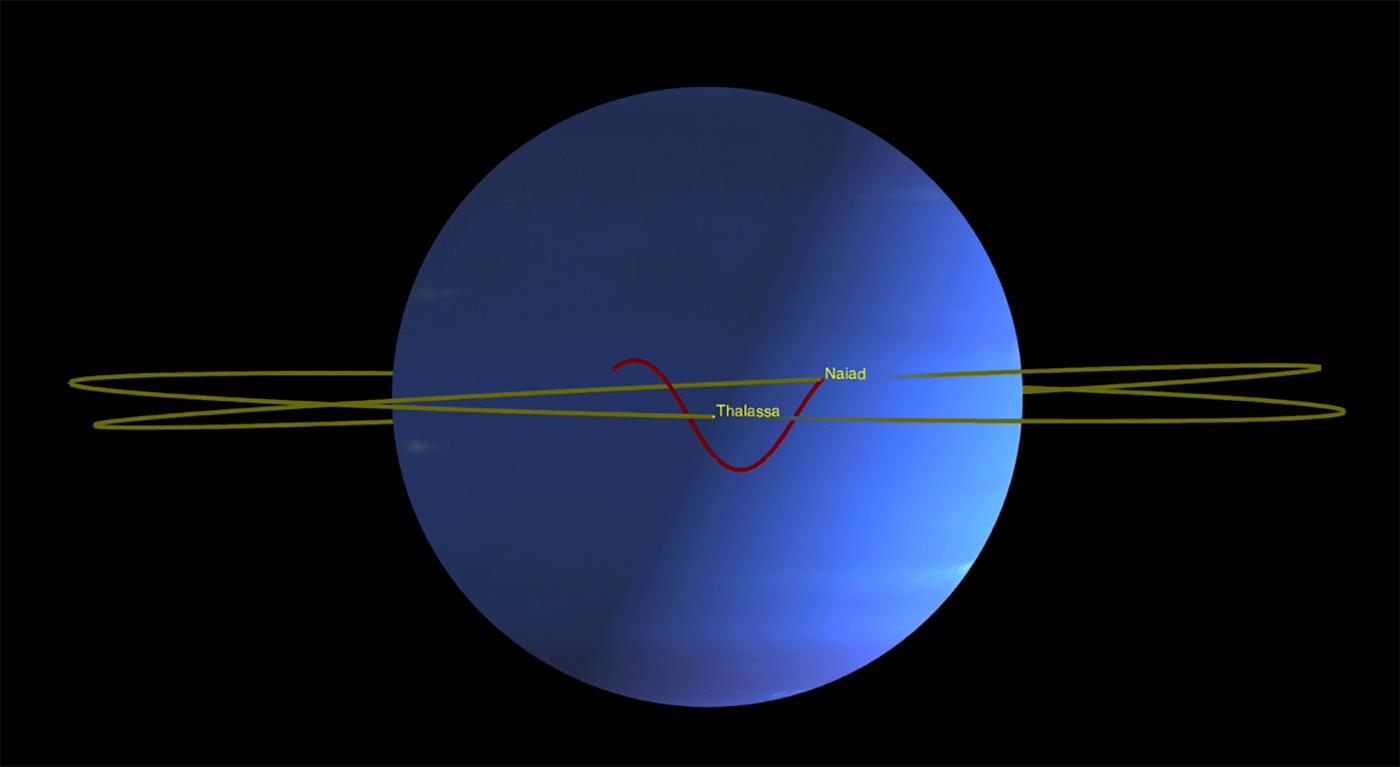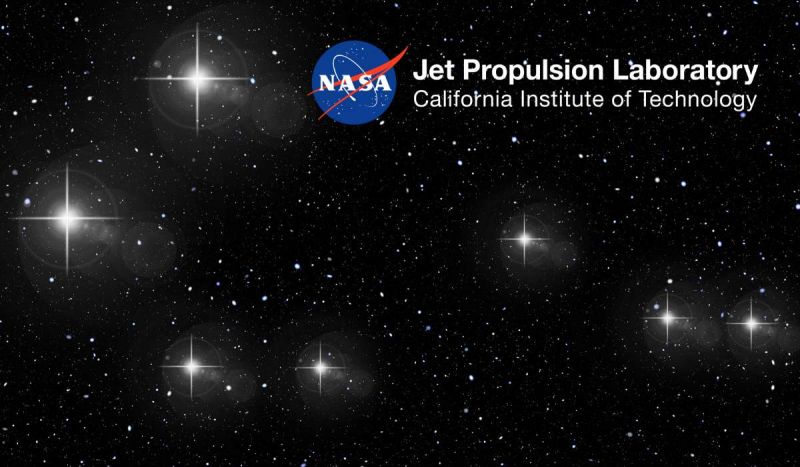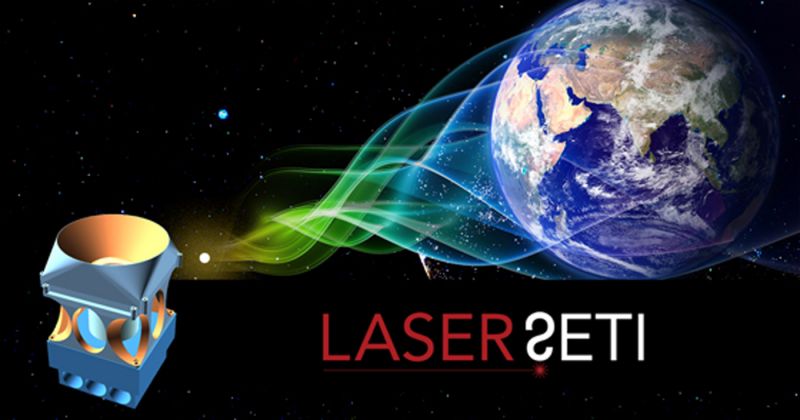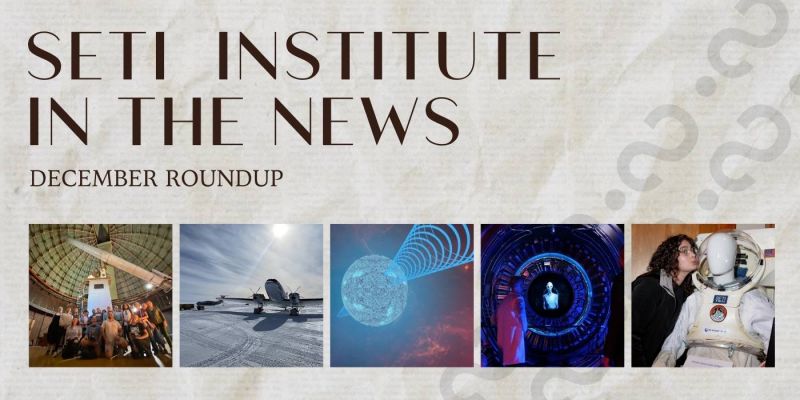
Even by the wild standards of the outer solar system, the strange orbits that carry Neptune's two innermost moons are unprecedented, according to newly published research.
Orbital dynamics experts are calling it a "dance of avoidance" performed by the tiny moons Naiad and Thalassa. The two are true partners, orbiting only about 1,150 miles (1,850 kilometers) apart. But they never get that close to each other; Naiad's orbit is tilted and perfectly timed. Every time it passes the slower-moving Thalassa, the two are about 2,200 miles (3,540 kilometers) apart.
In this perpetual choreography, Naiad swirls around the ice giant every seven hours, while Thalassa, on the outside track, takes seven and a half hours. An observer sitting on Thalassa would see Naiad in an orbit that varies wildly in a zigzag pattern, passing by twice from above and then twice from below. This up, up, down, down pattern repeats every time Naiad gains four laps on Thalassa.
Although the dance may appear odd, it keeps the orbits stable, researchers said.
"We refer to this repeating pattern as a resonance," said Marina Brozovic, an expert in solar system dynamics at NASA's Jet Propulsion Laboratory in Pasadena, California, and the lead author of the new paper, which was published Nov. 13 in Icarus. "There are many different types of 'dances' that planets, moons and asteroids can follow, but this one has never been seen before."
Far from the pull of the Sun, the giant planets of the outer solar system are the dominant sources of gravity, and collectively, they boast dozens upon dozens of moons. Some of those moons formed alongside their planets and never went anywhere; others were captured later, then locked into orbits dictated by their planets. Some orbit in the opposite direction their planets rotate; others swap orbits with each other as if to avoid collision.
Neptune has 14 confirmed moons. Neso, the farthest-flung of them, orbits in a wildly elliptical loop that carries it nearly 46 million miles (74 million kilometers) away from the planet and takes 27 years to complete.
Naiad and Thalassa are small and shaped like Tic Tacs, spanning only about 60 miles (100 kilometers) in length. They are two of Neptune's seven inner moons, part of a closely packed system that is interwoven with faint rings.
So how did they end up together - but apart? It's thought that the original satellite system was disrupted when Neptune captured its giant moon, Triton, and that these inner moons and rings formed from the leftover debris.
"We suspect that Naiad was kicked into its tilted orbit by an earlier interaction with one of Neptune's other inner moons," Brozovic said. "Only later, after its orbital tilt was established, could Naiad settle into this unusual resonance with Thalassa."
Brozovic and her colleagues discovered the unusual orbital pattern using analysis of observations by NASA's Hubble Space Telescope. The work also provides the first hint about the internal composition of Neptune's inner moons. Researchers used the observations to compute their mass and, thus, their densities - which were close to that of water ice.
"We are always excited to find these co-dependencies between moons," said Mark Showalter, a planetary astronomer at the SETI Institute in Mountain View, California, and a co-author of the new paper. "Naiad and Thalassa have probably been locked together in this configuration for a very long time, because it makes their orbits more stable. They maintain the peace by never getting too close."
The research is available to read and download here:
https://arxiv.org/abs/1910.13612
The Hubble Space Telescope is a project of international cooperation between NASA and ESA (European Space Agency). NASA's Goddard Space Flight Center in Greenbelt, Maryland, manages the telescope. The Space Telescope Science Institute (STScI) in Baltimore, Maryland, conducts Hubble science operations. STScI is operated for NASA by the Association of Universities for Research in Astronomy in Washington.
More information about Neptune's moons can be found here:
https://solarsystem.nasa.gov/moons/neptune-moons/in-depth/

About the SETI Institute
Founded in 1984, the SETI Institute is a non-profit, multi-disciplinary research and education organization whose mission is to lead humanity’s quest to understand the origins and prevalence of life and intelligence in the Universe and to share that knowledge with the world. Our research encompasses the physical and biological sciences and leverages expertise in data analytics, machine learning and advanced signal detection technologies. The SETI Institute is a distinguished research partner for industry, academia and government agencies, including NASA and NSF.
Contact information
Gretchen McCartney
Jet Propulsion Laboratory, Pasadena, Calif.
818-393-6215
gretchen.p.mccartney@jpl.nasa.gov
Alana Johnson
NASA Headquarters, Washington
202-358-1501
alana.r.johnson@nasa.gov





